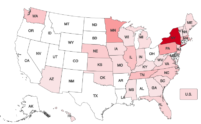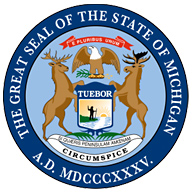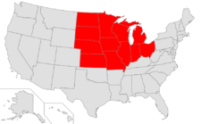Two more midwestern states passed laws last month requiring newspapers to post notices on their press association’s statewide public notice website. With Minnesota and Michigan joining South Dakota and Nebraska, four states in the region have now passed web-posting laws this year.
In total, eighteen states now have web-posting statutes on the books.
The new law in Minnesota requires newspapers to publish their notices on the Minnesota Newspaper Association’s statewide public notice website and to include an index link to the public notice section on their own websites. (Current law in Minnesota already requires newspapers to post notices on their website; the new law adds the index-link requirement and forbids the notices from being posted behind a paywall.)
Effort to end newspaper notice in Michigan falls short
 Two months ago, Michigan appeared to be in grave danger of moving its notices from newspapers to government websites.
Two months ago, Michigan appeared to be in grave danger of moving its notices from newspapers to government websites.
As one of his final acts as a state legislator, now-former Michigan House Speaker Lee Chatfield, R-Levering (pictured at right), led the move to eliminate newspaper notice in the state. Chatfield, who would be term-limited out of office on Dec. 31, had pursued that goal since he was elected to the House six years earlier. He made it one of his priorities for the brief lame-duck session that followed the Nov. 3 election.
Public notice in grave danger in Michigan
 Earlier the same week he visited the White House as part of Donald Trump’s ongoing effort to overturn the results of the presidential election, Michigan House Speaker Lee Chatfield, R-Levering (pictured at left) saw members of his caucus introduce a legislative package he hopes is the capstone of his half-decade project to move public notice in the state from newspapers to government websites.
Earlier the same week he visited the White House as part of Donald Trump’s ongoing effort to overturn the results of the presidential election, Michigan House Speaker Lee Chatfield, R-Levering (pictured at left) saw members of his caucus introduce a legislative package he hopes is the capstone of his half-decade project to move public notice in the state from newspapers to government websites.
It’s an unusual package of 105 separate bills that eliminate particular government notices — e.g., local government meetings, publication of new ordinances, etc. — spread throughout the state’s code. The bills are “tie-barred” to a single proposal, House Bill 6440, designed to serve as Michigan’s new general public notice statute. The tie-barred bills will only take effect if HB6440 passes.
‘Enemy of the people’ rhetoric takes toll on public notice in statehouses
 Bills have been introduced in at least seven states so far this year that would move most public notice from its traditional home in newspapers to lightly visited government websites. And at least of few of those bills were introduced by legislators who have had fraught relationships with the newspapers that cover them.
Bills have been introduced in at least seven states so far this year that would move most public notice from its traditional home in newspapers to lightly visited government websites. And at least of few of those bills were introduced by legislators who have had fraught relationships with the newspapers that cover them.
The states that appear at present to face the greatest potential peril — Florida, Kentucky, West Virginia and Missouri — have all been down this path before.
Michigan newspapers on high alert for new public notice bill
 Newspapers in Michigan expect a bill to be introduced soon that would move all local government notices from newspapers to government websites. Although similar bills have been introduced every legislative session in Lansing for the last 12 years, this time Michigan newspapers are in a state of alarm.
Newspapers in Michigan expect a bill to be introduced soon that would move all local government notices from newspapers to government websites. Although similar bills have been introduced every legislative session in Lansing for the last 12 years, this time Michigan newspapers are in a state of alarm.
“I’m more worried than I’ve ever been,” said Lisa McGraw, who has been public affairs manager of the Michigan Press Association (MPA) since 2003.
What makes this time different?
Foreclosure notices at issue in Midwestern states
A bill that would have eliminated the newspaper publication requirement for foreclosure notices in Indiana was narrowly defeated last week in a vote taken immediately following a committee hearing.
House Bill 1212 had passed the Indiana House 62-34 in January and was in danger of moving another step closer to passage when it was defeated by a vote of 5-4 in the Senate Local Government Committee.
Foreclosure Bill on Move in Missouri; Some Notices Eliminated in Kentucky
 A bill that would allow mortgage trustees in Missouri to publish foreclosure notices on websites rather than newspapers picked up momentum yesterday afternoon when it received a favorable vote in the House Legislative Oversight Committee. The next step is the House floor.
A bill that would allow mortgage trustees in Missouri to publish foreclosure notices on websites rather than newspapers picked up momentum yesterday afternoon when it received a favorable vote in the House Legislative Oversight Committee. The next step is the House floor.
SB 909 is widely believed to be an effort by trustees in this nonjudicial foreclosure state to profit off the notices they are required to publish before auctioning delinquent properties to the highest bidders. Two of the largest trustee law firms in Missouri have been the primary proponents of the legislation.
Michigan Approves Controversial Nestle Proposal Despite Public Opposition
 Q: When does a vote of 80,945 to 75 result in a win for the 75?
Q: When does a vote of 80,945 to 75 result in a win for the 75?
A: When a state agency gets to cast the deciding ballot.
Although it wasn’t technically a vote, Michigan’s Department of Environmental Quality (MDEQ) last month approved Nestle Water’s controversial request to pump more groundwater for its Ice Mountain bottling plant despite that lopsided margin. In fact, NPR reports that the 80,945 public comments MDEQ received opposing the proposal set a record.
N.C. County Targeted in Public Notice Bill
 If at first you don’t succeed, try, try again.
If at first you don’t succeed, try, try again.
North Carolina State Senator Trudy Wade (R-Greensboro, photo on left) heeded that advice and last week finally succeeded in passing a bill that makes government less transparent.
After her two previous efforts to move public notice in the state from newspapers to government websites failed, in March Wade introduced another sweeping revision of the state’s public notice laws. When her bill stalled in the House, as it had in the previous legislative session, Wade didn’t give up.
Government Website Notice Inadequate, Admits Environmental Agency
 The director of the same Michigan environmental agency under fire for dismissing concerns about the contamination of Flint’s water supply admitted her department failed to provide sufficient notice of another recent water proposal in the state, according to MLive Media Group.
The director of the same Michigan environmental agency under fire for dismissing concerns about the contamination of Flint’s water supply admitted her department failed to provide sufficient notice of another recent water proposal in the state, according to MLive Media Group.
Michigan Department of Environmental Quality (MDEQ) director Heidi Grether (pictured on the left) told an air and waste management law conference last week that 42 days on MDEQ’s website “probably” wasn’t sufficient to properly notify the public about a request by Nestle Waters North America to increase the amount of groundwater it pumps in Osceola County. Grether was named director of MDEQ in August after her predecessor was forced to resign in the wake of the Flint crisis.


